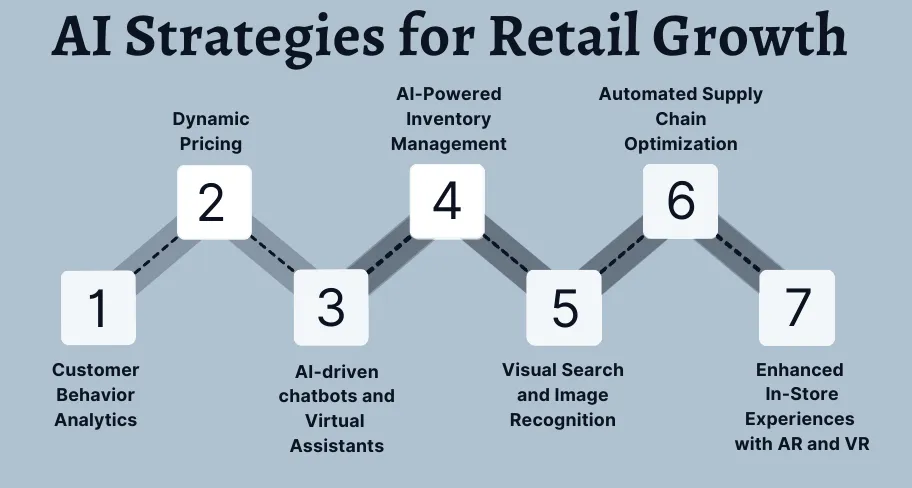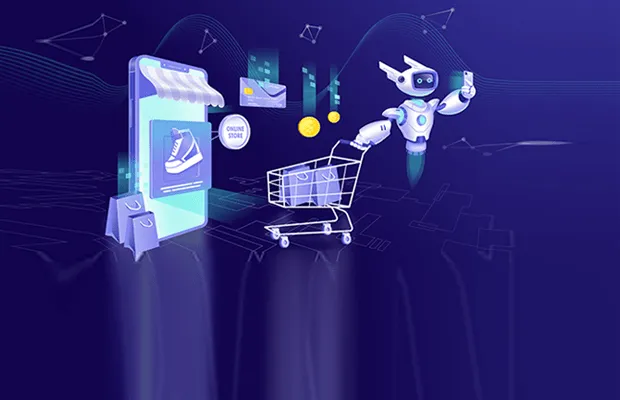Table of Contents
In today’s rapidly evolving retail landscape, artificial intelligence (AI) is no longer just a buzzword—it’s a vital tool for businesses seeking to stay competitive and drive growth.
From optimizing inventory management to enhancing customer experiences, AI in retail is revolutionizing how stores operate, whether they’re physical outlets or e-commerce platforms.

This article will explore how integrating AI can benefit physical retail stores, how small and medium-sized retail businesses can implement AI, and the challenges retailers may face in adopting these advanced technologies.
Benefits of Integrating AI in Retail with Physical Stores
AI in retail offers significant advantages for physical locations:
- Personalized Customer Experience: AI analytics track consumer behaviors to provide tailored recommendations, matching the customization found in e-commerce.
- Improved Inventory Management: AI analyzes sales data and trends to forecast demand accurately, reducing stockouts and overstock situations, leading to more efficient operations.
- Enhanced Store Operations: Solutions like smart shelves and automated checkouts streamline processes, allowing staff to focus on customer service.
- Increased Security: AI provides real-time facial recognition and behavior tracking, helping detect shoplifting and improve overall safety.
- Seamless Shopping Experience: Integrating AI bridges the digital and in-person retail gap, enhancing the overall customer journey.
7 Proven AI Strategies for Retail Growth

1. Customer Behavior Analytics
AI in retail analyzes customer behavior by collecting data on shopping habits, browsing patterns, and purchasing history. This enables retailers to personalize product recommendations and promotions, enhancing marketing efforts. Such data-driven personalization boosts customer engagement and encourages repeat visits, driving overall growth.
2. Dynamic Pricing
With AI, retailers can implement dynamic pricing, adjusting prices based on real-time factors like demand and competition. This ensures competitive pricing and maximizes profits, especially during peak seasons. AI streamlines price adjustments, making the process quicker and more efficient.
3. AI-driven chatbots and Virtual Assistants
AI-powered chatbots and virtual assistants enhance customer service in retail by answering questions and guiding users through the sales process. They handle numerous inquiries, allowing human staff to focus on complex issues. These tools improve engagement for physical stores by assisting customers with product availability.
4. AI-Powered Inventory Management
AI in retail improves inventory management by predicting stock levels accurately, ensuring product availability while reducing excess inventory. This leads to better resource allocation and cash flow, particularly for smaller retailers. AI also helps forecast trends, allowing stores to stay ahead of demand fluctuations.
5. Visual Search and Image Recognition
AI-driven visual search allows customers to find products using images instead of keywords, enhancing the shopping experience, especially in fashion and home décor. Retailers can suggest similar products, increasing the likelihood of sales and bridging the gap between online and in-store interactions.
6. Automated Supply Chain Optimization
AI optimizes the supply chain by analyzing data like shipping times and delivery costs, reducing expenses, and improving delivery efficiency. This enhances customer satisfaction by ensuring timely product availability, leading to higher sales and loyalty.
7. Enhanced In-Store Experiences with AR and VR
AI-powered AR and VR transform in-store experiences, allowing customers to visualize products in their homes or virtually try on items. These immersive technologies engage customers and reduce purchase uncertainty, driving conversions as AI evolves to create even more sophisticated integrations in retail.
Implementing AI Solutions for Small and Medium-Sized Retail Businesses

For small and medium-sized retail businesses, implementing AI in retail can seem daunting due to cost concerns. However, AI solutions are increasingly accessible through cloud-based platforms. Businesses can start by integrating AI-driven chatbots or virtual assistants to improve customer service and using off-the-shelf AI-powered inventory management software to optimize stock levels.
Collaborating with tech vendors or adopting software-as-a-service (SaaS) offerings tailored to retail can also facilitate AI adoption. These solutions often require lower upfront investments and provide flexible pricing based on usage. Additionally, many AI tools integrate seamlessly with existing systems, easing the transition for businesses without dedicated IT resources.
Challenges of Implementing AI in Retail
Despite the benefits of AI in retail, several challenges can hinder implementation:
- Cost: Advanced AI systems often require significant upfront investment for data collection and infrastructure. Small and medium-sized businesses can reduce costs by leveraging cloud-based AI solutions.
- Data Privacy and Security: AI systems handle vast amounts of customer data, necessitating secure data storage and compliance with regulations like GDPR to maintain customer trust.
- Complexity: Implementing AI requires expertise in data science and IT infrastructure, which can be challenging for smaller retailers lacking in-house technical talent. Collaborating with AI vendors or hiring specialists can help.
- Change Management: Training employees to use new AI systems is essential but can be time-consuming. Successfully managing this change is crucial for the adoption and effective use of AI technologies.
AI for a Future-Ready Retail Experience
The integration of AI in retail has the potential to revolutionize both online and physical stores, offering personalized customer experiences, improving inventory management, and optimizing supply chains. By implementing the seven growth strategies outlined in this article, retailers can unlock the power of AI and enhance operational efficiency.
While challenges such as cost, data privacy, and technical expertise remain, AI-driven solutions are becoming increasingly accessible to businesses of all sizes, offering long-term value and significant growth opportunities.





